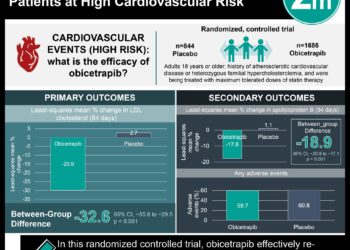Strong evidence lacking to compare management strategies for renal artery stenosis
1. Evidence is lacking to demonstrate significant differences in mortality, progression to end-stage renal disease, rates of cardiovascular disease events, improvements in kidney function or blood pressure control between revascularization with stenting and medical therapy for renal artery stenosis.
2. Revascularization with stenting may be more useful in high-risk renal artery stenosis with hemodynamic instability or acute decompensation.
Evidence Rating Level: 2 (Good)
Study Rundown: Atherosclerotic renal artery stenosis (ARAS) is a narrowing of the arteries that supply blood to the kidneys. It is increasingly common in the elderly with possible complications that include chronic kidney disease, hypertension, and coronary artery disease. Treatment options for ARAS currently include revascularization, primarily via percutaneous transluminal renal angioplasty with stent placement (PTRAS), and medical therapy including blood pressure medications, statins, and antiplatelet agents. Previous evidence in the literature, including two large randomized control trials (RCTs) including the CORAL (Cardiovascular Outcomes in Renal Atherosclerotic Lesions) and ASTRAL (Angioplasty and Stenting for Renal Artery Lesions) trials have shown no clear difference between the two modalities of treatment.
The present study compares the benefits of PTRAS and medical therapy through a comparative effectiveness analysis of 83 published studies that included RCTs, observational studies, and case reports. Overall, there were no statistically significant differences in mortality, kidney function, cardiovascular events, renal replacement therapy, or pulmonary edema between the two groups. Based on individual case reports, PTRAS may be more useful in high-risk individuals with hemodynamically instability from ARAS or in those with acute decompensation.
Overall, the study suggests no clear benefits of PTRAS over medical therapy in ARAS. RCTs used in this study were limited by small sample sizes and restrictive eligibility criteria. The non-randomized comparative studies (NRCSs) used were also limited by small sample sizes, substantial bias towards PTRAS as a favorable study and a possible element of reporting and publication bias. A reanalysis of available research or more targeted studies that control for differences in characteristics among the intervention groups may be needed to determine the comparative effectiveness of the two interventions.
Click to read the study in the Annals of Internal Medicine
Relevant Reading: Revascularization versus Medical Therapy for Renal-Artery Stenosis
In-Depth [systematic review]: The study followed a standard Agency for Health Research and Quality (AHRQ) protocol. Eligible studies from 1993 to 2016 were searched across various data sources including MEDLINE, EMBASE, and Cochrane databases. Only studies that reported treatment and long-term (≥ 6 months) outcomes were included. These included randomized control trials (RCTs), nonrandomized comparative studies (NRCSs), non-comparative single group studies, and case reports. Cochrane risk-of-bias tool for RCTs, and Newcastle-Ottawa Scale were applied in assessing the studies. Effect sizes using odds ratio and hazard ratios were used to compare different groups in the studies. Overall, 83 studies were included. The RCTs showed low strength of evidence of no difference when comparing mortality, kidney function, renal replacement therapy, pulmonary edema, and blood pressure improvements between groups that underwent PTRAS or medical therapy. NRCSs showed similar results with the exception of heterogenous effects on kidney function and blood pressure, possibly related to inadequate intrinsic control in their individual study designs. Case reports demonstrated clinical improvement with PTRAS in patients with acute decompensation. Overall, strong evidence is currently lacking to compare management strategies for atherosclerotic renal artery stenosis.
Image: CC/Wiki
©2016 2 Minute Medicine, Inc. All rights reserved. No works may be reproduced without expressed written consent from 2 Minute Medicine, Inc. Inquire about licensing here. No article should be construed as medical advice and is not intended as such by the authors or by 2 Minute Medicine, Inc.







